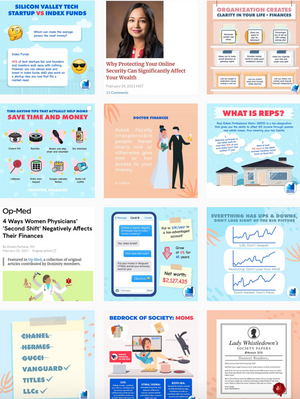With rocketing amounts of credit card and student loan debt affecting millions of Americans, it’s easy to wonder how we get stuck in these financial sinkholes to begin with. Why aren’t Americans better educated about finances and money management? Why isn’t financial literacy or money management taught in schools? These are definitely important questions. Here are some startling statistics about the state of money management in the US:
- Americans have $1 trillion in credit card debt with
- 44% of Americans don’t have enough cash to cover a $400 emergency
- 58% of Americans have less than $1,000 in savings
- 38.1% of Americans carry credit card debt
- Half of American households live paycheck to paycheck
- Only 32% of US families follow a household budget
- Americans aged 24-39 (the prime years to start savings, especially retirement savings) have a median emergency savings of just $2,000
- 40+% of student loan payments are going unpaid (pre-pandemic)
- 20% of Americans have zero annual savings from paychecks
- 33% of Americans have saved ZERO money for retirement

And these statistics don’t take into account the physical and psychological ramifications of poor money management. Here are some ways your physical health and mental health can be negatively affected if you have poor money management skills:
- Higher blood pressure, which can be a pre-cursor to other health issues like heart attacks and strokes.
- More muscle tension, which can manifest as back pain, headaches, and migraines.
- Digestive issues, including ulcers, caused by stress and anxiety over financial problems, one of which can be the inability to purchase healthier foods.
- Other medical issues caused by not going to the doctor due to the associated costs.
- Greater chances of depression, with the severity escalating as money issues get worse.
- More anxiety and overall stress, which often leads people to try and cope through unhealthy habits.
- Feelings of shame, which can lead to further isolation from family and friends, exacerbating the problem and causing many to seek relief through those unhealthy habits.
With these alarming statistics in mind, more recently, COVID has financially affected millions of American households. This leading to unanticipated and often immediate layoffs, furloughs, medical issues, mental health issues, and other COVID-related financial issues—some still unknown and probably to come, as well as the “normal” things that happen in life that can affect our financial situations. It’s enough to cause everyone and anyone an increased amount of stress and anxiety.
So, taking these statistics into account, as well as the obvious lack of financial know-how by the majority of Americans, why isn’t money management taught more in schools? Why are only 17% of American high schoolers required to take even just one semester of a financial literacy-based class in order to graduate? It doesn’t make sense at all. It seems like money management classes would be a no-brainer for any school curriculum beginning in the elementary school years but especially for high schoolers who are on the brink of entering the “real” world with all its potential financial hazards.

Here are some reasons why financial literacy and money management aren’t taught in schools:
Many feel that financial education is the responsibility of parents.
While the primary and most important education for any child is from their parents, many parents can often use the help of financial education themselves and hence, are unable to teach their children proper financial habits. If parents don't have financially sound practices in place, it is hard to teach their children through their action. We have also learned from the pandemic that homeschooling and teaching is challenging, and parents have limited time between working, cooking, "zooming" and much more, that teaching financial education is often not high on the list.
Personal finance isn’t part of the ACT or SAT.
With the strong emphasis on passing tests that is prevalent in many states and school districts, subjects that teach life skills —no matter how important—are often not tested and left out of the school curriculum. These topics don't “count” when it comes to evaluating a school’s success and/or acceptance into colleges and universities. Sadly, many important life skills aren't taught in school but are essential to life such as mental health, completing tasks effectively, project management and healthy financial habits.
Most teachers aren’t always qualified—or don’t feel qualified—to teach finance-based classes.
Just like financial education is not in the school curriculum, it is also not present in the teachers' degree curriculum. This plays into the point above: if a subject won’t “count” towards a school’s overall success, teachers aren't encouraged to gain that qualification or knowledge such as teaching topics in personal finance.

Education and curriculum are state-based, not nationally-based.
Educational curriculums vary state to state. What is important to one state might not be important to another state, so financial literacy education can be erratic depending on the state’s stance on including money management skills in curriculums. Yes, this is odd given we all use the same dollar, and personal finance affects all of us!
Educators can’t agree on which financial concepts should be taught.
There are so many different financial literacy theories that it can be daunting for a teacher to know which ones to teach. Finances can be a confusing subject for many people since it involves childhood experiences, how one's mindset was shaped around money and their current life situation. However, there are basic tried-and-true ways to teach budgeting, savings, long-term broad based investing, and much more that can greatly benefit young people, and should be added to all school curriculums.

While the reasons for the lack of financial education in schools may have some validity, there is still a critical need for students to receive this type of education in some manner. After all, our kids are our future, and based on the current status of personal finance in America, we need to do better.





